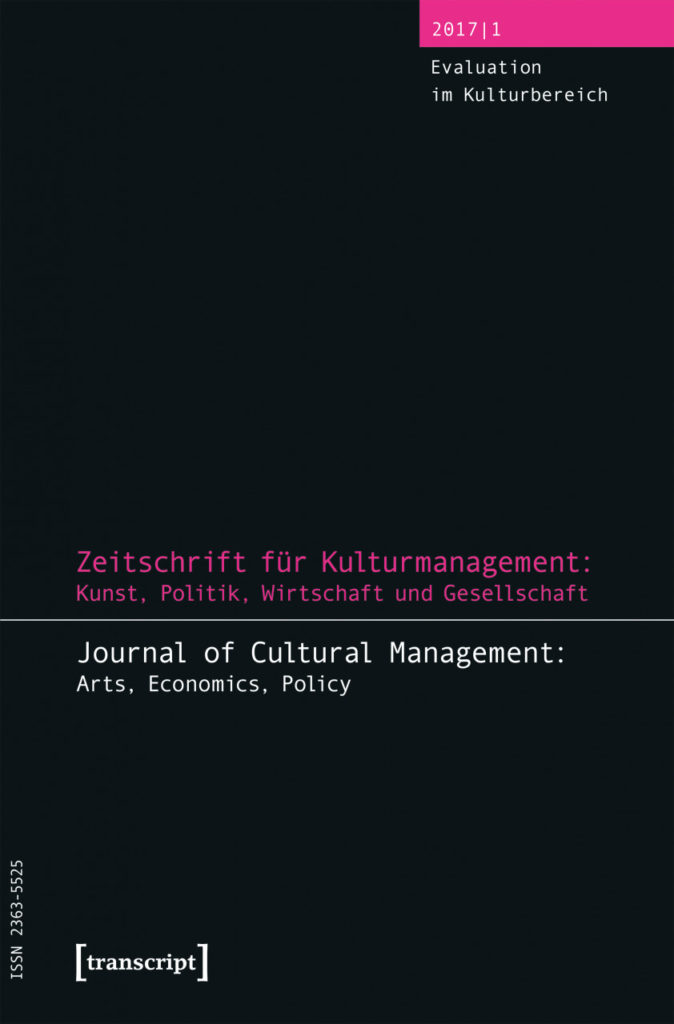Essay
Lernen braucht Mut
Evaluation in der kulturellen Bildung
Abstract
Program and project evaluations in cultural education are conducted on a regular basis, but unfortunately often as a matter of routine with predictable results. Based on their own research, the authors develop a concept of evaluation that fosters institutional learning. The article develops rules and working steps for participative evaluation geared toward successful learning. Generally, evaluation involves an intense communicative process between the funding body, evaluated institution and other stakeholders. Evaluation is organized in such a way that learning happens in a loop, in which mistakes and problems are rectified. The funding body and evaluated institution are guided in such a way that they can update their aims, their actions, and their goals. The combination of qualitative and quantitative research methods makes it possible to locate problems in the program or project and understand the reasons for these flaws. However, a culture in which flaws are appreciated as learning opportunities is often desired in theory but not welcomed in practice. But in a positive climate, they do help in further developing institutions and processes.
Keywords
2017 (1)
Evaluation im Kulturbereich

Related Articles
Yearbook for Culture Management 2011
Essay
Yearbook for Culture Management 2013
Conference Review
‘Southern’ perspectives about cultural management: some thoughts
Journal of Cultural Management 2019 (1)
Essay
Yearbook for Culture Management 2013
Essay
The role of culture in development
From tangible and monetary measures towards social onesJournal of Cultural Management 2017 (2)
Research Article
Zumutungen organisierten Arbeitens im Kulturbereich
Yearbook for Culture Management
Essay
© 2026, Journal of Cultural Management and Cultural Policy
Keywords
- Aesthetics
- Higher Education
- Cultural Diplomacy and Foreign Cultural Policy
- Occupation
- Career and Professional Role
- Audience Development
- Audience Studies and Visitor Studies
- Visitor Motivations
- Business
- Covid Pandemic
- Democracy
- Digitalization
- Diversity
- Third Sector
- Empirical Aesthetics
- Development
- Ethics
- Evaluation
- Field Theory
- Festival
- Film
- Federalism
- Community Arts
- Societal Change
- Ideology
- Staging
- Career
- Communication
- Concert
- Creative Industries
- Creativity
- Crisis
- Culture
- arts organizations, cultural organizations
- Cultural Participation
- Cultural Change
- Fincancing The Arts
- Cultural Promotion Law
- Cultural History
- Cultural Management
- Cultural Economy
- Cultural Organizations
- Art Education
- Cultural Policy
- Cultural Production
- Cultural Sociology
- Art Education
- Cultural Understanding
- Arts Administration
- Cultural Industry
- Cultural Sciences
- Art
- Art Field
- Arts Research
- Artists
- Artistic Research
- Artistic Reputation
- Arts Management
- Arts Organizations
- Art education
- Arts Marketing
- Arts Administration
- Curating
- Leadership
- Literature
- Advocacy
- Management
- Marketing
- Market
- Media
- Methods Development
- Mexico
- Monumentalizing
- Museum
- Music
- Non-Visitor Studies
- Opera
- Orchestra
- Organization
- Political Expression
- Post-truth Politics
- Professional Role
- Audience
- Audience Development
- Law
- Government
- Role
- Socially Engaged Art
- Social Cohesion
- Social Change
- Social Cohesion
- Non-visitor Socio-demographics
- Socioculture
- State
- Symbolic capital
- Dance
- Participatory Justice
- Theatre
- Theatre Governance
- Theory Development
- Tourism
- Transformation
- Survey
- Entrepreneurship
- Urbanism
- Civil Society


